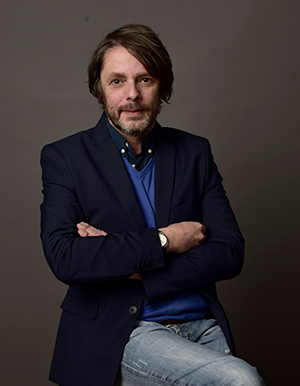Adriano O. Henriques Lab

 |
Bacterial spores are encased in a protein coat that confers resistance against chemicals, lysis and predation, and is a key sensor of the environment. We are studying the molecular mechanisms that drive the sporulation process with model organisms, to also understand pathogenicity in dangerous strains, and to look for biotechnological and medical applications of spores. |
|
Adriano O. Henriques Phone (+351) 214469521 |
|
 |
Research Interests
We study the developmental biology of Bacillus subtilis and related organisms. We are interested in essential processes in bacterial cell biology and development such as how cells achieve and maintain proper cell shape, and how they differentiate into specialized cell types. During spore differentiation, for instance, the two cells that participate in the process use cell-cell communication pathways and checkpoints to coordinate their programs of gene expression and to keep them in pace with the course of morphogenesis. They also have to assemble multiprotein structures and organelles at specific cellular addresses and times during development. We use a combination of genetics, cell biology, biochemistry, structural and computational biology to study these processes.
Clostridium difficile is a strict anaerobe sporeforming organism and currently a major nosocomial pathogen. Spores are essential for the dissemination of epidemic strains and for the environmental and host persistence of this intestinal pathogen. We also study spore development in this organism, the structure and function of the spore surface layers and their role during infection as well as the regulatory links between spore formation and the production of virulence factors such as the toxins, flagella, or biofilms. Biofilms are a form of bacterial multicellular organization, which protects against harmful conditions in the host and creates nutrient-rich niches. We have identified new genes involved in biofilm formation in C. difficile and we are elucidating the structure of the biofilm and the spatiotemporal control of its assembly.
Group Members
- Adriano O. Henriques, Associate Professor
- Mónica Serrano, PhD, FCT Investigator
- Carolina Cassona, PhD student
- Patrícia Amaral, PhD student
- Sara Ramalhete, PhD student
- Aristides Mendes, PhD student
- Eleonora Marini, PhD student
- Amaury Fasquelle, PhD student
- Bruno Espírito Santo, research fellow
- Ana Roque, Master Degree student
- Diogo Martins, Master Degree student
Selected Publications
- Mónica Serrano, Nicolas Kint, Fátima C. Pereira, Laure Saujet, Pierre Boudry, Bruno Dupuy, Adriano O. Henriques*, Isabelle Martin-Verstraete* (2016) A Recombination Directionality Factor Controls the Cell Type-Specific Activation of σK and the Fidelity of Spore Development in Clostridium difficile. PLoS Genet 12(9): e1006312. doi:10.1371/journal.pgen.1006312
- Mónica Serrano, Adam D. Crawshaw, Marcin Dembek, João M. Monteiro, Fátima C. Pereira, Mariana Gomes Pinho, Neil F. Fairweather, Paula S. Salgado and Adriano O. Henriques (2016) The SpoIIQ-SpoIIIAH complex of Clostridium difficile controls forespore engulfment and late stages of gene expression and spore morphogenesis. Molecular Microbiology 100(1):204-28. doi: 10.1111/mmi.13311
- Mónica Serrano, JinXin Gao, João Bota, Ashley R. Bate, Jeffrey Meisner,
Patrick Eichenberger, Charles P. Moran, Jr., Adriano O. Henriques (2015) Dual-Specificity Anti-sigma Factor Reinforces Control of Cell-Type Specific Gene Expression in Bacillus subtilis. PLoS Genet 11(4): e1005104. doi:10.1371/journal.pgen.1005104
Laboratory's Website
For further information visit the laboratory's website
Desenvolvimento Microbiano (PT)
Em condições nutricionais muito adversas, algumas bactérias iniciam um processo de diferenciação celular que resulta na produção de esporos. Os esporos são estruturas celulares metabolicamente adormecidas, capazes de resistir a condições extremas, incluindo ambientes extraterrestres simulados ou reais, que resultariam na destruição rápida das células originais. Acima de tudo, os esporos bacterianos resistem ao tempo podendo permanecer viáveis durante muitos milhões de anos. Representam assim um meio eficiente de preservação do genoma, actuando como verdadeiras cápsulas do tempo. A nossa actividade centra-se no estudo dos mecanismos moleculares que controlam a metamorfose da célula bacteriana num esporo, incluindo a geração de assimetria e de informação posicional, a coordenação entre a expressão genética e o curso da morfogénese, e a montagem de estruturas supramoleculares. Utilizamos sobretudo o organismo modelo não patogénico Bacillus subtilis, para o qual existem ferramentas poderosas de análise genética. Alguns projectos do laboratório procuram tirar partido das propriedades únicas destes esporos para aplicações em biotecnologia e em biomedicina. Outros projectos lidam com a identificação e a inactivação de esporos já que noutras espécies, por exemplo em B. cereus ou B. anthracis, estes são determinantes no estabelecimento de doenças.









